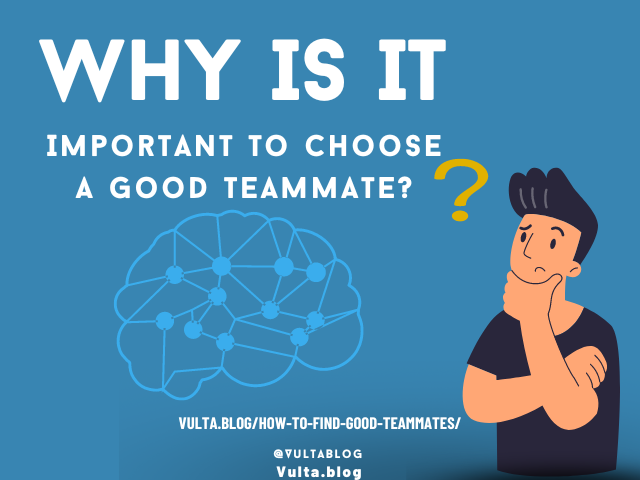How to find and identify good teammates
When it comes to achieving a project or goal, having a strong and supportive team can make all the difference. But how do you find good teammates who will help you succeed? In this blog post, we'll share some tips and strategies for finding the right people to join your team.

Why is it important to choose a good teammate?
Finding good teammates is a crucial factor in determining the success of a project or goal. It is the most important factor to consider when structuring a chain of command.

Possessing bad teammates, can negatively impact your organization’s or group’s work and productivity. Having an inept person as a teammate will eventually lead to frustrations and the demolition of the group’s culture, then the group itself.
Who needs to know how to find good teammates?
Recruiters and anyone aspiring to be or in a leadership position needs to know the art of finding good teammates.
What to look for when choosing a teammate
What do you look for when choosing a teammate? Before we start discussing on how to find good teammates, we must first clarify what a good teammate is.
Everybody has different standards for a good teammate, there are however common accepted required attributes that a teammate must have to be considered good.
The lists of attributes below are the most accepted requirements that a teammate must have to be considered good.
These are the main attributes to look for:
- Loyalty: Examine the person’s history, has he ever betrayed someone? This question will determine whether this person is trustworthy or not. Betrayal is costly, it is best to determine a person’s trustworthiness early on.
- Competency: How effective is this person on doing what he does? Is he qualified enough to be part of your team? Recruiting an inept person is a waste of resources.
- Reliability: Estimate the person’s success rate, how often does this person get the job done? Having an ally that you can depend on will ease your worries and workflow immensely.
These are beneficial attributes to have as well:
- Honesty: Being able to always trust someone’s words is a sign of loyalty and reliability. Honesty is a very rare trait to have the hardest to identify, people who have this attribute tend to be loyal as well but do keep in mind that loyalty and honest don’t always come together.
- Adaptability: The ability to adapt in a change of environments—which in this case, workplaces, and equipment, is a sign of competency. People who have this attribute tend to have the ability to persevere even in tough times.
- Empathy: The ability to pick up an unusual or change of emotion grants the person additional information to be able to decide what is the best course of action when dealing with other co-workers.
- Communication skills: This refers to the ability to be punctual when expressing an idea or opinion. Effective communication will reduce the chances of miscommunications and other ineffective communication problems.
All persons in the world are a mixture of all these attributes, it is your job as a recruiter to identify what attributes these people possess, this skill can only be honed through observing and examining people for a great deal of time.
The perfect teammate refers to the person who possesses the three main attributes, these types of people are extremely rare, but they do exist, gain and maintain their loyalty whatever the cause.
A Good teammate refers to a person possessing any of the two from the main attributes list.
Folks who only possess one attribute from the main list are considered average, though they are not the ideal teammate, they have the potential to acquire more good attributes through training or by simply persevering in their work life.
A bad teammate can refer to a teammate who does not possess any of the main list of desired attributes.
How to Find Good Teammates
Recruit former colleagues

Former colleagues tend to be the safer hire than the rest of the other ways, because you already know their strengths, weaknesses, work ethic, and how they will fit in with your company culture.
Recruit Freelancers

Use freelance marketplaces, such as Upwork, Fiverr, and Freelancer, to find freelancers with the skills and experience you need.
Freelancers are cost-effective mercenaries; they are perfect for completing projects with specific timelines.
Since you only pay them for the work they complete, you do not have to worry about benefits and other overhead costs.
The only downside for hiring freelancers is that they tend to not have the same level of commitment compared to a full-time employee.
View Job Boards

Job boards are online platforms that allow employers to advertise job openings and job seekers to search for available positions.
They have become a popular tool for both job seekers and employers, as they provide an easy and efficient way to connect with potential job opportunities or candidates.
Post job listings on online job boards, such as LinkedIn, Glassdoor, Indeed, and Monster. These platforms allow you to target your search to specific skills, experience, and locations.
Use Social Media

One of the simplest way to find good teammates is to hire people in social media, of course you must do research on them to determine whether the person has proof of being experienced.
Use social media platforms, such as Twitter, Facebook, and Instagram, to post job listings and attract potential teammates. You can also reach out to people directly through these channels.
There is no such thing as a bad teammate

The problem of identifying bad teammates is that we would feel too guilty to kick them out from the team.
An effective way to get rid of this feeling of guilt is to simply see them as hindrances, something that poisons the team as a whole, and if left long enough, destroys it.
Bad teammates, when left alone for long enough, will destroy the group dynamic, then, it is only a matter of time before the group dissolves.
Things to keep in mind
- Hiring a former colleague can create potential conflicts of interest, especially if they have close relationships with current employees. Be transparent about the situation and make sure to mitigate any conflicts that may arise.
- Ask to see their portfolio and check their experience to ensure that they have the skills and experience necessary for the job.
- Review the past performance records of new hires to ensure that they can meet the expectations of the role you are hiring them for.
- Agree on a clear pricing structure and payment terms upfront. Ensure that there are no hidden fees or charges.
- Provide any necessary onboarding and training to ensure that they have the information and resources they need to complete the project.
Copyright ©2023 by Marshall Vulta




Comments ()